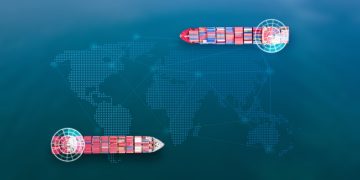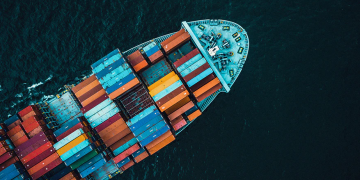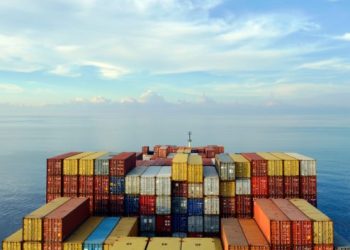Contrary to the dystopian portrayals of humanoid robots dominating the world in Hollywood movies and science fiction books, the present development of AI is not as alarming or sophisticated. Rather, AI has progressed to offer various specific advantages across different industries.
AI has the potential to enhance efficiency in the shipping industry by automating tasks such as processing and providing real-time analytics. Machine learning utilizes an organization’s past and current data to minimize risks, acting as a valuable tool for informed decision-making.Top of Form
What is AI?
According to Britannia Club, AI is a machine’s ability to perform the cognitive functions we associate with human minds, such as perceiving, reasoning, learning, interacting with an environment, problem solving, and even exercising creativity.
AI stands out from traditional computer software due to its capability to learn and adapt to tasks, improving its outputs as it becomes more familiar with them, making it an exceptionally versatile tool.
In particular, the shipping industry is experiencing a transformative wave with the integration of Artificial Intelligence (AI) technologies. AI offers a range of advantages that significantly enhance operational efficiency, safety, and sustainability within the maritime sector.
AI applications in the shipping industry
- Fleet Management: AI can be used to optimize fleet operations and improve the efficiency of shipping routes, by analyzing data from GPS, weather and traffic.
- Predictive Maintenance: AI can be used to predict when equipment and vehicles will need maintenance, this will help to reduce downtime and save costs.
- Autonomous ships: AI can be used to develop autonomous ships that can navigate, dock, and make decisions on their own, increasing safety and efficiency in the industry.
- Cargo Optimization: AI can be used to optimize cargo loading and unloading, by analyzing data on cargo weight and volume, vessel stability, and port infrastructure.
- Risk Management: AI-based risk management systems can analyze data from various sources to identify and mitigate risks in the shipping industry, such as weather, traffic and piracy.
- Supply Chain Management: AI can be used to optimize the entire shipping process, from order management, to logistics and inventory management.
Advantages of AI in the Maritime Shipping Industry
The integration of Artificial Intelligence (AI) into the maritime shipping industry brings forth a myriad of advantages, revolutionizing traditional practices and enhancing overall efficiency. In particular:
- Cost reduction: AI data tracking and analysis pinpoint inefficient resource use and expensive operations, identifying areas of overconsumption, particularly in fuel usage. Crews can devise strategies to curtail fuel usage, resulting in reduced organizational costs.
- Enhancing efficiency: By optimizing routes, port access, and implementing automated navigation, ships incorporating AI and machine learning support crews in maintaining and elevating efficiency standards. Automated features enable teams to delegate tasks such as data collection and navigation to computers, freeing them to concentrate on other critical responsibilities.
- Promoting sustainability: Numerous organizations prioritize sustainable practices, and AI can play a pivotal role in aiding endeavors to cut down on carbon emissions and waste through comprehensive resource analysis. Monitoring fuel consumption helps identify instances where ships use more finite resources than required or indicates reductions in emissions.
Disadvantages
The integration of Artificial Intelligence (AI) in the shipping industry undoubtedly offers numerous benefits, such as improved operational efficiency, enhanced safety, and optimized route planning. However, this technological advancement also brings along certain potential risks. Shipowners must conduct due diligence to ensure that AI implementation aligns with their specific needs and operation, justifying its cost.
- High costs: Developing a machine capable of replicating human intelligence is a significant undertaking, demanding considerable time and resources that translate into a substantial financial investment. To stay current and align with the latest standards, AI systems must run on up-to-date hardware and software, further contributing to their high costs.
- No creativity: While AI can accumulate knowledge through pre-existing data and past encounters, it struggles to adopt an inventive approach.
- Lack of clear strategy: Risks can be controlled when managing the process with a step-by-step case. A clear strategy establishes a set of actions to create an advantage over competitors.
What about the AI hypnosis?
The intersection of AI and hypnosis brings forth innovative possibilities for the field of therapeutic interventions. Artificial Intelligence, with its capacity for personalized interactions and data analysis, is increasingly being integrated into hypnotherapy practices.
AI involves machines performing tasks that traditionally demand human intelligence, while hypnosis is a phenomenon altering an individual’s consciousness. In the medical realm, hypnotism has been utilized to address conditions such as anxiety, depression, and phobias. Both AI and hypnosis serve as potent tools for comprehending the human brain, prompting researchers to investigate the potential synergies between these two technologies.
AI and hypnosis possess the potential to revolutionize various aspects of our lives, spanning healthcare, education, and transportation. Through the integration of AI and hypnosis, healthcare providers can tailor treatment plans based on individual medical histories, allowing patients to receive personalized care from the comfort of their homes.
As technology progresses, continuous enhancements in AI systems can be anticipated. In a future where AI and the human mind collaborate, new job categories may emerge, requiring collaboration with and oversight of AI.































































